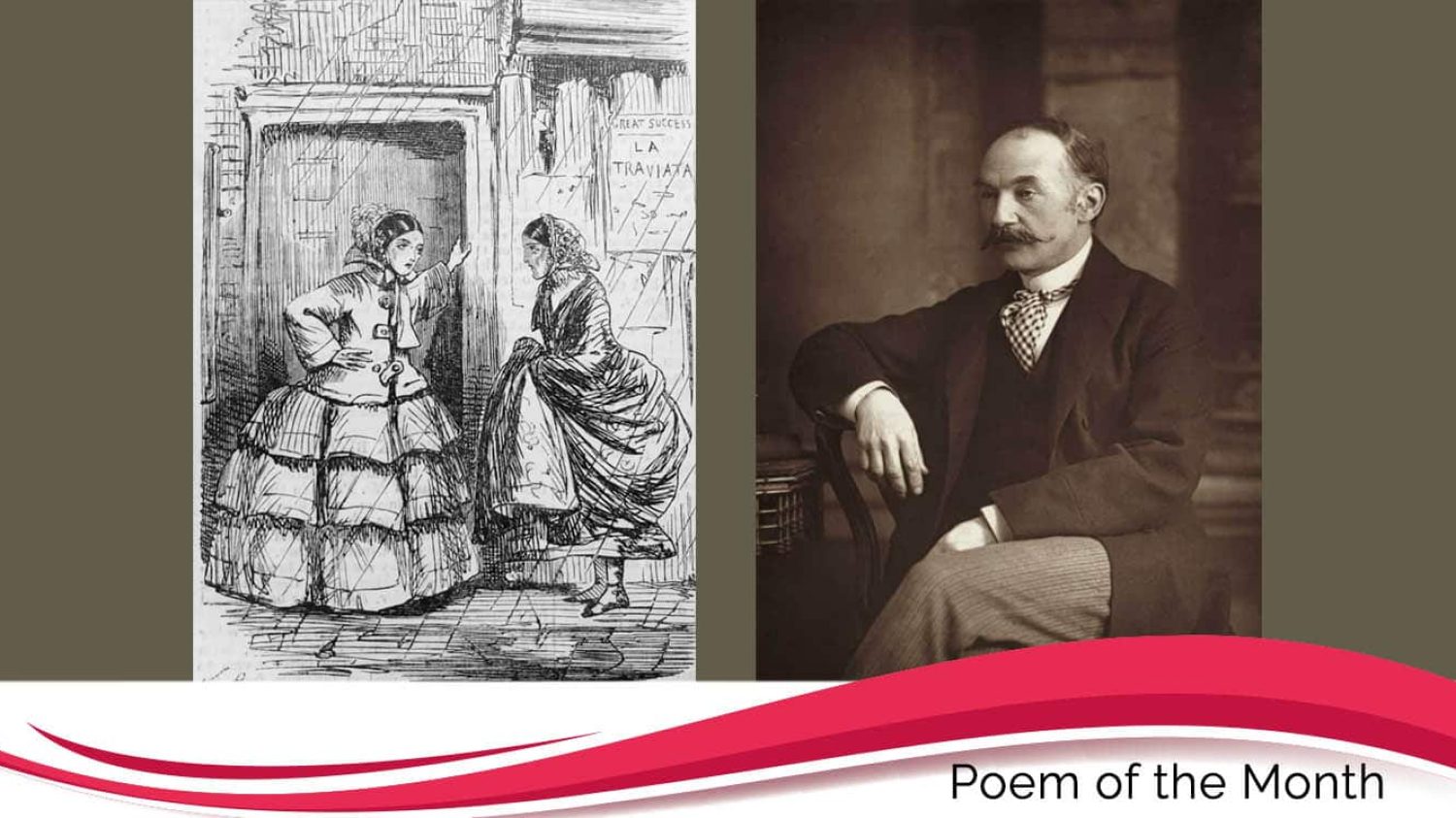Thomas Hardy is not a writer noted for a sense of humour, but this is one of his few comic poems. Or is it? Is it rather an attack on the distorted moral values of Victorian society?
The Ruined Maid by Thomas Hardy
“O ‘Melia, my dear, this does everything crown!
Who could have supposed I should meet you in Town?
And whence such fair garments, such prosperi-ty?” —
“O didn’t you know I’d been ruined?” said she.
— “You left us in tatters, without shoes or socks,
Tired of digging potatoes, and spudding up docks;
And now you’ve gay bracelets and bright feathers three!” —
“Yes: that’s how we dress when we’re ruined,” said she.
— “At home in the barton you said thee’ and thou,’
And thik oon,’ and theäs oon,’ and t’other’; but now
Your talking quite fits ‘ee for high compa-ny!” —
“Some polish is gained with one’s ruin,” said she.
— “Your hands were like paws then, your face blue and bleak
But now I’m bewitched by your delicate cheek,
And your little gloves fit as on any la-dy!” —
“We never do work when we’re ruined,” said she.
— “You used to call home-life a hag-ridden dream,
And you’d sigh, and you’d sock; but at present you seem
To know not of megrims or melancho-ly!” —
“True. One’s pretty lively when ruined,” said she.
— “I wish I had feathers, a fine sweeping gown,
And a delicate face, and could strut about Town!” —
“My dear — a raw country girl, such as you be,
Cannot quite expect that. You ain’t ruined,” said she.
The poem was written in 1866 but was only first published (in a bowdlerised form) in 1901. It’s a conversation poem, with the talk taking place between two women. The ‘ruined’ maid, Amelia, has learned to speak ‘proper’ English, but the ‘unruined’ girl speaks with a local dialect.
Amelia has become the mistress of a rich man, or works as a high-class prostitute. She wears beautiful clothes, her hands have softened and she sees nothing at all to regret in the life she leads. Of course, Victorian society sees her as ‘ruined’, beyond any hope of redemption and cast out of polite society, but the country maid who meets her can only sigh in envy at her former friend’s lifestyle.
Hardy was fascinated by the position of women. Look at his portrayal of Tess once she has been raped and left pregnant with an illegitimate child – society condemns her, refuses church burial to her baby, and when Angel learns of her past, he abandons her (although he too has had ‘a past’ with women). This satirical poems shows the same concern. Amelia is presently doing very nicely, but the shadow of the future is there in the poem – what happens to Amelia when she loses her youth and beauty? Then she will sink into the terrible ruin and poverty of an ageing prostitute.
There’s a delightful acted-out YouTube recording of the poem here:
In 1981 there was an ‘opera skit’ of the poem, and it has also been set to music by Judith Lang Zaimont.
Did you enjoy this poem? Let me know by leaving a comment.
Selected links for relevant websites, books, movies, videos, and more. Some of these links lead to protected content on this website, learn more about that here.
Susannah Fullerton: Thomas Hardy is born
Susannah Fullerton: Thomas Hardy marries for the second time
Susannah Fullerton: Edward, Prince of Wales, lunches with Thomas Hardy
Susannah Fullerton: Thomas Hardy dies
Susannah Fullerton: Beyond the Last Lamp by Thomas Hardy
Susannah Fullerton: When I set out for Lyonnesse by Thomas Hardy
Susannah Fullerton: In Church by Thomas Hardy
Susannah Fullerton: The Ruined Maid by Thomas Hardy
Susannah Fullerton: Wessex, a wire fox terrier
Susannah Fullerton: Thomas Hardy’s Ale
Susannah Fullerton: 5 Unpopular 19th Century Novels that Became Classics
Susannah Fullerton: Thomas Hardy: Novelist and Poet
Susannah Fullerton: Literary Readers Guide to Far From the Madding Crowd by Thomas Hardy
Susannah Fullerton: Video Talk – Tess of the D’Urbervilles by Thomas Hardy
Hardy Society
Hardy’s World
Poetry Foundation: Thomas Hardy
The Guardian: Thomas Hardy
The Victorian Web: Thomas Hardy

KEVIN ROZZOLI
I enjoyed the poem. It shows just another facet of Hardy’s brilliance, I have read most of his books and was not aware that he had ever dabbled in verse. One wonders what triggered the thought process behind his decision to pen these lines. I see it as a “bitter sweet” comment on the morals of his time.
Susannah Fullerton
Thomas Hardy wrote novels to make money, but always regarded himself first and foremost as a poet. Claire Tomalin’s wonderful biography, ‘Thomas Hardy: The Time-Torn Man’ is especially good on his poetry.
Yes, there is much that is bitter-sweet about this poem.
Honey
An adorable poem.
Thank you for offering us gems like these.
Sylvia
I really enjoy this poem, but it has a sad side, showing that the only way for a poor girl to change her life was by selling herself. Hardy must have been aware of this, his heroines often have difficulty over coming their lowly birth.
Susannah Fullerton
Yes, it’s a poem that leaves you feeling there’s little joy ahead for either of the women. Hardy was so sympathetic to the plight of females in Victorian society, and yet he did not make a good husband to either of his wives.
Paddy
I liked the poem, but I can never forgive Hardy for The Voice. So self indulgent when he was so mean to his wife when she was alive.